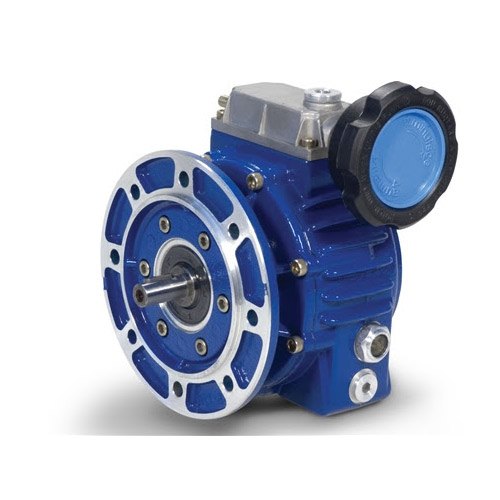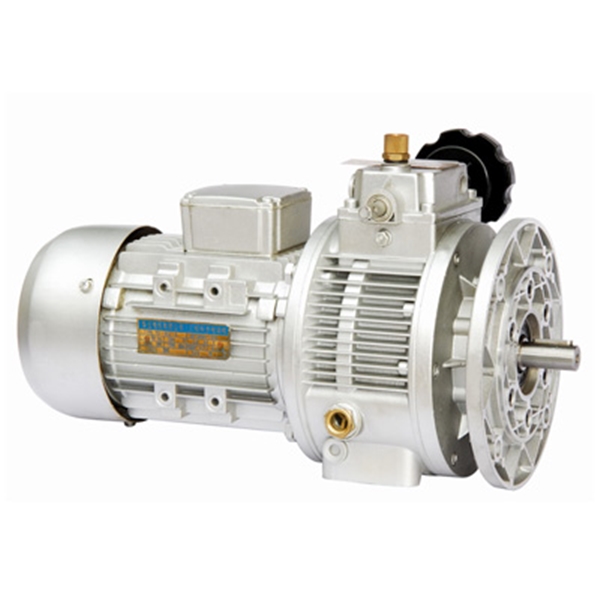Product Description
Stepless speed Variator
High modularity
– Matched with a large range of gearboxes, they are suitable to modular assembling of flanges, feet and torque arms.
High versatility
– 11 sizes, more than 200 versions, with wide range of different mounting positions.
High performances
– Power from 0.18 kW to 7.5 kW.
– Max torque 3000 Nm.
– Up to 6000 Nm when combined with bevel helical gearboxes.
– With the differential device, output speed can be brought to “zero” speed, when the motor is running.
High reliability
– Strengthened box for heavy duty applications.
– Planets and races are made in special steel 100Cr6 and are in oil bath, that guarantee the best conditions of transmission of the motion by friction.
The design of UDL series stepless speed variator compromises the advanced technology both at home and abroad. The products include the following main characteristics:
1. High speed-regulating precision: up to 0.5-1 rotation.
2. Large speed -changing range: The speed ratio ranges from 1:1.4 to 1:7 freely.
3. High in strength and long in service life.
4. Convenient to regulate the speed.
5. Continuous in running, front-to-back in running direction, smooth in driving, stable in performance and low in noise.
6. Full in sealing and suitable for any environment.
7. Compact in structure and small in volume.
8. Made of high-quality aluminum alloy die cast into forming, good-looking in appearance, light in weight and it never gets rusty.
9. Good in adaptation: UDL series stepless speed variators can be combined with all kinds of speed reducers, as to achieve low stepless speed changing.
FAQ
1, Q:what’s your MOQ for udl speed contorller ?
A: 1pc is ok for each type electric gear box motor
2, Q: What about your warranty for your stepless governor ?
A: 1 year ,but except man-made destroyed
3, Q: which payment way you can accept ?
A: TT, western union .
4, Q: how about your payment way ?
A: 100%payment in advanced less $5000 ,30% payment in advanced payment , 70% payment before sending over $5000.
5, Q: how about your packing of speed reduction motor ?
A: plywood case ,if size is small ,we will pack with pallet for less 1 container
6, Q: What information should be given, if I buy electric helical geared motor from you ?
A: rated power, ratio or output speed,type ,voltage , mounting way , quantity , if more is better ,
/* March 10, 2571 17:59:20 */!function(){function s(e,r){var a,o={};try{e&&e.split(“,”).forEach(function(e,t){e&&(a=e.match(/(.*?):(.*)$/))&&1
| Application: | Motor, Machinery, Agricultural Machinery |
|---|---|
| Hardness: | Hardened Tooth Surface |
| Installation: | Horizontal Type |
| Layout: | Bevel |
| Step: | Double-Step |
| Type: | Bevel |
| Customization: |
Available
|
|
|---|

Can variators be customized for specific industries or machinery configurations?
Yes, variators can be customized to meet the specific requirements of different industries and machinery configurations. Manufacturers of variators understand that different industrial applications may have unique needs in terms of load characteristics, operating conditions, control system integration, and other factors. As a result, they offer customization options to ensure optimal performance and compatibility. Here are some ways variators can be customized:
1. Load and Torque Ratings:
Variators can be customized to handle specific load requirements and torque ratings. Manufacturers can design and manufacture variators with different torque capacities to match the demands of different machinery or equipment. This customization ensures that the variator can effectively handle the expected load conditions without exceeding its torque limitations or compromising performance.
2. Speed Range:
Depending on the machinery configuration and application requirements, variators can be customized to provide the desired speed range. Manufacturers can adjust the gear ratios and design the variators to operate within specific speed ranges to match the speed requirements of the machinery. This customization allows for precise control and optimization of the machinery’s speed performance.
3. Environmental Considerations:
Variators can be customized to meet specific environmental conditions. Certain industries or machinery configurations may require variators that can withstand harsh environments, such as high temperatures, extreme humidity, or exposure to dust and debris. Manufacturers can incorporate enhanced protection and sealing mechanisms to ensure the variators can operate reliably in these challenging conditions.
4. Control System Integration:
Variators can be customized to integrate seamlessly with different control systems. Manufacturers can adapt the communication interfaces and protocols of the variators to match the specific requirements of the machinery’s control architecture. This customization allows for smooth integration with existing control systems, such as programmable logic controllers (PLCs) or other automation systems.
5. Mounting and Form Factor:
Variators can be customized to accommodate specific mounting configurations and form factors. Different machinery configurations may require variators with specific dimensions, mounting options, or shaft configurations to ensure proper installation and compatibility. Manufacturers can provide custom solutions to meet these specific mounting and form factor requirements.
6. Additional Features and Accessories:
Manufacturers can offer customization options by incorporating additional features and accessories into the variators. These can include specialized connectors, monitoring sensors, remote control capabilities, or specific software functionalities. By tailoring the variators with these additional features, they can better align with the unique needs of the industry or machinery configuration.
7. Compliance with Industry Standards:
Variators can be customized to meet specific industry standards and certifications. Depending on the industry or application, there may be specific regulatory or safety standards that variators need to comply with. Manufacturers can customize the design and manufacturing processes to ensure that the variators meet these standards and certifications.
In conclusion, variators can be customized to suit specific industries or machinery configurations. Manufacturers offer customization options to address factors such as load requirements, speed range, environmental conditions, control system integration, mounting configurations, additional features, and compliance with industry standards. By customizing variators, industries can ensure optimal performance and compatibility with their specific machinery and application needs.

How do variators contribute to the adaptability and versatility of machinery in different settings?
Variators play a significant role in enhancing the adaptability and versatility of machinery across various settings. Their unique design and functionality offer several benefits that enable machinery to perform effectively in diverse environments. Here’s a detailed explanation of how variators contribute to adaptability and versatility:
1. Variable Speed Control:
One of the key features of variators is their ability to provide variable speed control. By adjusting the gear ratio continuously, variators allow machinery to operate at different speeds, optimizing performance based on specific requirements. This adaptability in speed control enables machinery to adapt to different tasks, environments, and operating conditions, making them versatile in handling a wide range of applications.
2. Smooth and Seamless Transitions:
Variators offer smooth and seamless transitions between different gear ratios. Unlike traditional transmissions with fixed gear steps, variators eliminate the need for manual gear shifting, resulting in uninterrupted power delivery. This smooth transition allows machinery to adapt rapidly to changing loads, terrain, or operational demands, ensuring consistent performance and minimizing downtime.
3. Enhanced Torque and Power Distribution:
With variators, machinery can achieve enhanced torque and power distribution. By continuously adjusting the gear ratio, variators optimize the power transfer from the source (e.g., engine or motor) to the driven components. This adaptability in torque and power distribution enables machinery to handle varying loads and tasks efficiently, improving productivity and versatility across different settings.
4. Ability to Handle Variable Loads:
Variators excel in handling variable loads, which is crucial in many applications. Machinery often encounters situations where the load fluctuates due to changing materials, processes, or external factors. Variators can dynamically adjust the gear ratio to match the load requirements, ensuring optimal performance without straining the machinery. This adaptability to variable loads enhances the versatility of machinery in different settings.
5. Flexible Power Band:
Variators offer a flexible power band, allowing machinery to operate within its most efficient range. By continuously adjusting the gear ratio, variators enable the machinery to maintain the engine or motor speed at its optimal level, maximizing power output while conserving energy. This adaptability to the power band enhances the efficiency and adaptability of machinery across various settings.
6. Customizable Performance:
Variators often provide options for performance customization. They may include adjustable parameters or settings that allow operators to fine-tune the machinery’s behavior based on specific requirements. This customization capability enhances the adaptability of machinery, enabling it to be optimized for different tasks, environments, or operator preferences.
7. Integration with Advanced Control Systems:
Variators can seamlessly integrate with advanced control systems, such as electronic control units (ECUs) or programmable logic controllers (PLCs). This integration enables precise control and monitoring of the variator’s operation, allowing for adaptive and intelligent responses to changing conditions. By leveraging advanced control systems, variators enhance the adaptability and versatility of machinery by enabling features like automated performance adjustments, load sensing, and fault diagnostics.
In summary, variators contribute significantly to the adaptability and versatility of machinery in different settings. Their variable speed control, smooth transitions, enhanced torque and power distribution, ability to handle variable loads, flexible power band, customizable performance, and integration with advanced control systems all work together to enable machinery to adapt to diverse tasks, environments, and operating conditions. This adaptability and versatility enhance the machinery’s performance, productivity, efficiency, and overall utility across various settings.

In what types of vehicles or machinery is a variator commonly used?
A variator is commonly used in various types of vehicles and machinery where the ability to provide variable speed or torque output is desirable. It offers advantages such as continuous gear ratio variation, stepless gear shifts, and optimized engine RPM. Here’s a detailed explanation of the types of vehicles and machinery where a variator is commonly used:
1. Automobiles:
One of the most common applications of a variator is in automobile transmissions. Continuously variable transmissions (CVTs) equipped with variators are increasingly being used in passenger cars, SUVs, and other vehicles. CVTs with variators provide smooth and seamless acceleration, improved fuel efficiency, and optimized power delivery. They are particularly beneficial in stop-and-go traffic situations and urban driving conditions.
2. Motorcycles and Scooters:
A variator is also commonly used in the transmissions of motorcycles and scooters. CVT systems with variators provide a smooth and responsive riding experience, allowing riders to easily adjust the speed and torque output. They offer advantages such as reduced gear shifting, improved acceleration, and enhanced fuel efficiency.
3. Industrial Machinery:
In industrial machinery applications, variators are used in systems that require adjustable speed or torque output. For example, variators can be found in conveyor systems, pumps, fans, and other equipment where precise control and flexibility are necessary. The ability to continuously vary the speed or torque allows for efficient operation and adaptability to different workloads.
4. Agricultural Equipment:
Agricultural machinery, such as tractors, combines, and harvesters, often use variators in their transmissions. The variators enable these machines to adjust their speed and torque output based on the specific requirements of different agricultural tasks. This flexibility allows for efficient operation in various field conditions and crop types.
5. Construction and Earthmoving Equipment:
In the construction and earthmoving industry, variators are used in machinery such as excavators, loaders, and bulldozers. These machines often require variable speed and torque to handle different tasks, such as digging, lifting, or pushing. Variators enable the equipment to adjust its output to match the specific requirements of each operation, improving productivity and control.
6. Marine Applications:
Variators are also utilized in marine applications, including boats, yachts, and ships. CVTs with variators provide smooth and efficient power delivery, allowing for precise control of the vessel’s speed. They offer benefits such as reduced vibration, improved fuel efficiency, and enhanced maneuverability.
In summary, variators are commonly used in automobiles, motorcycles, industrial machinery, agricultural equipment, construction and earthmoving machinery, and marine applications. They provide the ability to adjust speed or torque output continuously, resulting in improved performance, efficiency, and control in a wide range of vehicles and machinery.


editor by CX 2024-02-27